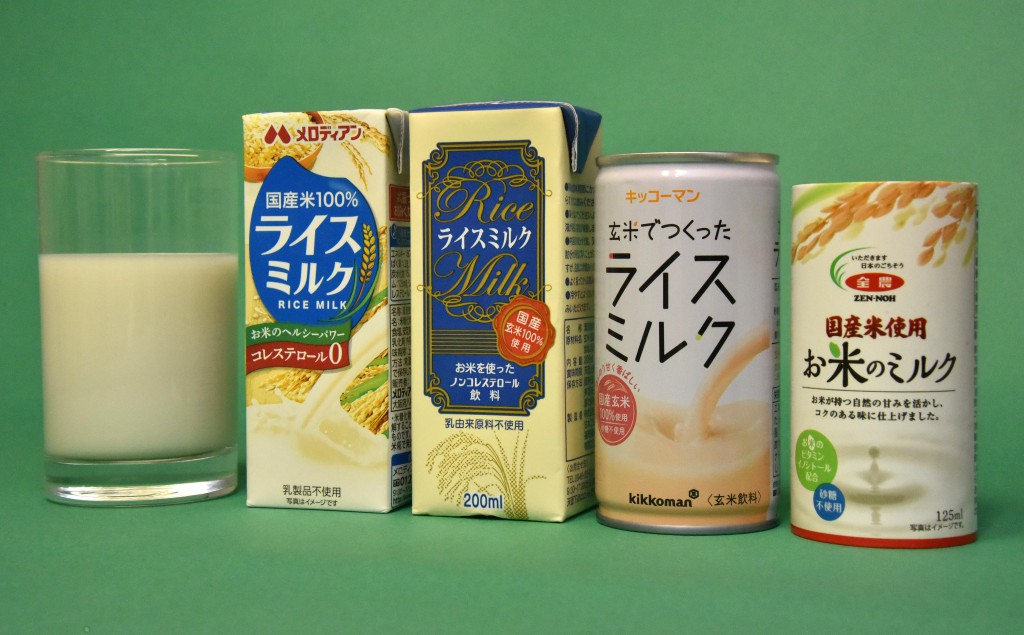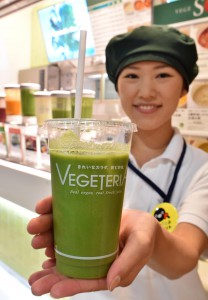
New rice milk beverages launched in 2015. Shown at right in the photo is Zen-Noh’s rice milk to be released in October.

“Green healthy balance juice containing 30 ingredients” is one of Vegeteria’s hot-selling items today (in Taito-ku, Tokyo)
Rice milk is a grain milk made from rice. Being low in calorie, low in fat and cholesterol-free, it’s starting to gain ground in the Japanese market as a new healthy option for milk particularly among women. Its consumption is growing, and expected to grow further, as major food producers bring out new rice milk products while in-station juice bars adds rice milk beverages on their menu. In the near future in Japan, you’ll be able to buy cow’s milk, soy milk and rice milk anytime, anywhere.
Growing popularity
A juice bar “Vegeteria, Ecute Ueno” in the JR Ueno Station in Taito-ku, Tokyo, is always crowded with both female and male passengers, mostly commuters. They stop by on the way to the office or home to buy a cup of “Green healthy balance juice containing 30 ingredients (Regular size: 220 ml, JPY390)”. The fresh juice that contains cabbage, asparagus and other green fruits and vegetables tastes rather mild and what makes it so smooth is rice milk.
The same green veggie juice with cow’s milk had been one of the regular items at the in-station juice stand until late August this year, but the shop started to sell an alternative version using rice milk and that became a brisk seller. A 30-year-old female customer quickly finished the cup and said, “I prefer the rice milk version as it better brings out the flavor of vegetables.” She comes to the juice stand three to four times a week since the shop started to sell the rice milk veggie juice.
There are 26 Vegeteria juice stands in Tokyo and its suburb. A representative of the operating company of the Vegeteria juice stands, Rock Field Co., Ltd. in Kobe-shi, Hyogo Prefecture, said, “The rice milk juice was added on our menu only a month ago but it already has many regular customers.” So the company is introducing “Tamba Sasayama Black Bean Juice” that also uses rice milk in this autumn. “Rice milk goes excellent with fresh fruits and vegetables. It brings out real flavor of them without spoiling them.”
Raising rice consumption
Beverage companies are also making entries into the new market. Fukuren Co. Ltd., a subsidiary of National Federation of Agricultural Cooperative Associations (Zen-Noh) Fukuren Branch, has released packed rice milk (200 ml) in June this year, featuring the use of domestically-grown rice. Fukuren has already sold a total of 20,000 cases (one case contains twelve 200-ml packages).
Kikkoman Corporation has also launched “Rice milk made of domestically-grown brown rice (190 ml)” in May. The soy sauce company has a website exclusively designed for the rice milk product to explain what it is and how to use it in daily dishes and drinks, hoping that the website will encourage the rice milk consumption. A Kikkoman spokesperson said, “It’s getting popular among health-conscious women and sales are growing.”
JA Zen-Noh is also entering the market with “Rice Milk” starting in October. Takeshi Kato, Deputy General Manager of the Zen-Noh Life Retail Department said, “We want to expand the market, making full use of the Zen-Noh brand that uses domestic food. This will hopefully expand the rice consumption as well.”
One can of Zen-Noh “Rice Milk (125 ml)” contains 17 grams of rice, which is equivalent to one third of a rice ball sold at a convenience store in Japan. So the rice milk can be an easy alternative for rice. The Zen-Noh rice milk will be available at A Coop and JA Supermarket stores with the first shipment of 40,000 cans.
(Oct. 5, 2015)

